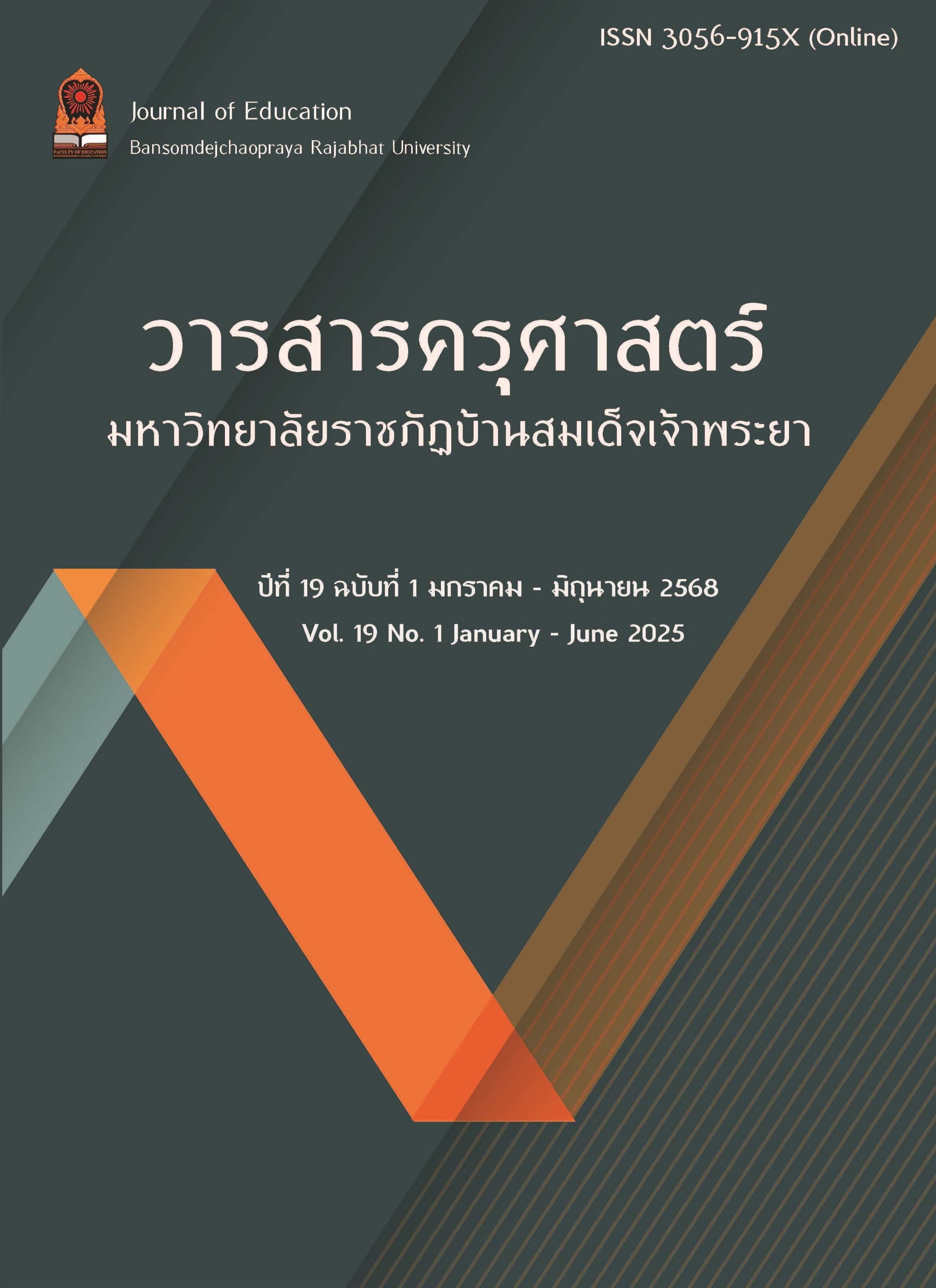Components of the evaluation of the curriculum for teacher and administrator development using the PLC reflection model through integrated experiences and organizational management technology for excellence: a case study of the project to improve the quality of education in reading, writing, and analytical thinking in Samut Sakhon Province
Keywords:
curriculum assessment, teacher administrators, organizational management, excellence, reading, writing, critical thinkingAbstract
This research aimed to analyze the confirmatory components of the curriculum evaluation of teachers and administrators with PLC reflection model through integrated experiences and organizational management technology for excellence: A case study: the project to enhance the quality of education in reading, writing, and analytical thinking in Samut Sakhon Province that administrators and those involved in education management play a crucial role in creating a collaborative network and jointly setting clear goals, managing the work with morality and knowledge, and giving everyone the opportunity to participate for maximum benefit. By analyzing the confirmatory components of the curriculum and the curriculum evaluation. The sample group used in the research consisted of 100 students, 50 graduates, and 300 product users, obtained by stratified random sampling, 40 teachers, 20 administrators, obtained by simple random sampling, and 5 qualified persons, obtained by purposive sampling. The research instruments were questionnaires. Data were analyzed using advanced statistical programs. The questionnaire had a reliability value of .95, resulting in component weights between 0.30 - 0.57 The statistics used in data analysis were df, p, GFI, AGFI, CFI, RMSEA.
The results of the research found that:
1. Confirmatory components of the curriculum consisted of ethics Knowledge, intelligence, relationship, analysis and management of reading, writing and critical thinking. The model is consistent with empirical data. The component weights are between 0.74 - 0.93.
2. The confirmatory components of curriculum evaluation include context, inputs, processes and outputs. The model is consistent with empirical data. The component weights are between 0.74 - 0.93
Downloads
References
คณะกรรมการการศึกษาขั้นพื้นฐาน. (2554). แนวทางการพัฒนาและประเมินการอ่าน คิดวิเคราะห์ และเขียน. กรุงเทพฯ : ชุมนุมสหกรณ์การเกษตรแห่งประเทศไทย.
จันตรี คุปตะวาทิน. (2553). การพัฒนาหลักสูตรและสื่อการเรียนการสอน (พิมพ์ครั้งที่ 4). สาขาวิชาศึกษาศาสตร์ มหาวิทยาลัยสุโขทัยธรรมาธิราช.
จุฑาทิพย์ จันเรือน. (2552). การประเมินหลักสูตรศึกษาศาสตรมหาบัณฑิต สาขาวิชาการวัดและประเมินผลการศึกษา มหาวิทยาลัยเชียงใหม่ (ปรับปรุง พ.ศ.2543). วิทยานิพนธ์ ศึกษาศาสตรมหาบัณฑิต บัณฑิตวิทยาลัย มหาวิทยาลัยเชียงใหม่ .
จุฑาพร ช่วยชูวงศ์. (2552). การประเมินหลักสูตรสถานศึกษาของโรงเรียนพลวิทยาระบบสองภาษา สังกัดสํานักงานเขตพื้นที่การศึกษาสงขลา เขต 2. วิทยานิพนธ์การศึกษามหาบัณฑิต มหาวิทยาลัยทักษิณ.
ชวลิต ชูกาแพง. (2551). การพัฒนาหลักสูตร Curriculum Development. มหาสารคาม : มหาวิทยาลัยมหาสารคาม.
ชัยวัฒน์ สุทธิรัตน์. (2556). การพัฒนาหลักสูตร ทฤษฎีสู่การปฏิบัติ. กรุงเทพฯ : วีพรินท์.
พศิน แตงจวง. (2554). รูปแบบการพัฒนาสมรรนะบุคลากรทางการศึกษา. กรุงเทพฯ : ดวงกมล.
พันธุ์ทิพย์ ธรรมสโรช. (2565). การควบคุมกำกับและประเมินผลเชิงกลยุทธ์. (เอกสารประกอบการสอน). ปทุมธานี: มหาวิทยาลัยธรรมศาสตร์.
พัชราภรณ์ ดวงชื่น. (2561). ผู้นำองค์กรในโลก VUCA. วารสารมหาวิทยาลัยคริสเตียน, 24(3), 451.
พิรุฬห์พร แสนแพง และพงศ์เทพ จิระโร. (2563). การพัฒนารูปแบบการพัฒนาตนเองด้วยกระบวนการ PLC ของครูศูนย์การศึกษานอกระบบ และการศึกษาตามอัธยาศัย การพัฒนารูปแบบการพัฒนาตนเองด้วยกระบวนการ PLC ของครูศูนย์การศึกษานอกระบบ และการศึกษาตามอัธยาศัย. วารสารวิจัยมหาวิทยาลัยเวสเทิร์น มนุษยศาสตร์และสังคมศาสตร์. 6 (2), 1-2.
Downloads
Published
How to Cite
Issue
Section
License
Copyright (c) 2025 Faculty of Educaion Bansomdejchaopraya Rajabhat University

This work is licensed under a Creative Commons Attribution-NonCommercial-NoDerivatives 4.0 International License.
บทความที่ได้รับการตีพิมพ์เป็นลิขสิทธิ์ของคณะครุศาสตร์ มหาวิทยาลัยราชภัฏบ้านสมเด็จเจ้าพระยา
ข้อความที่ปรากฏในบทความแต่ละเรื่องในวารสารวิชาการเล่มนี้เป็นความคิดเห็นส่วนตัวของผู้เขียนแต่ละท่านไม่เกี่ยวข้องกับมหาวิทยาลัยราชภัฏบ้านสมเด็จเจ้าพระยา และคณาจารย์ท่านอื่นๆในมหาวิทยาลัยฯ แต่อย่างใด ความรับผิดชอบองค์ประกอบทั้งหมดของบทความแต่ละเรื่องเป็นของผู้เขียนแต่ละท่าน หากมีความผิดพลาดใดๆ ผู้เขียนแต่ละท่านจะรับผิดชอบบทความของตนเอง



